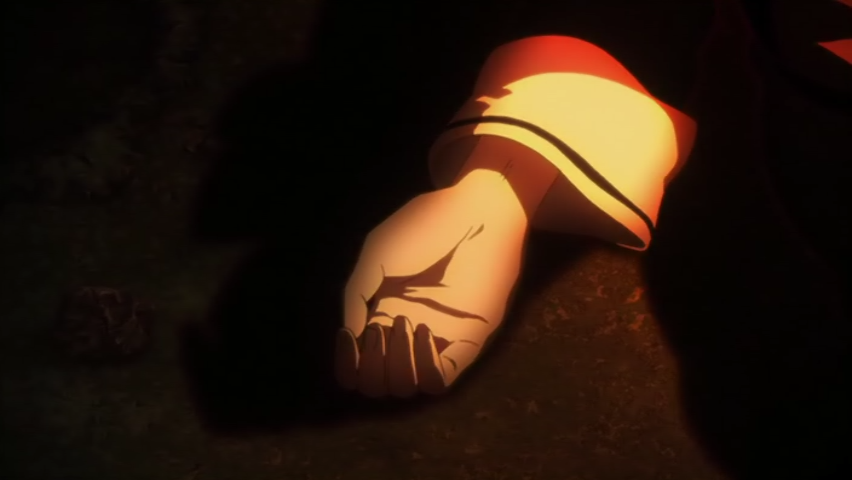
Violence and sex are two things I intensely dislike when used as prominent themes in the stuff I watch, especially the former. The third film opens with a dash of disturbing scenes strongly featuring both, and I have every reason to be ired by that. Judging the book by it’s cover Kara no Kyoukai should never have been something that captures my fancy, and yet, as folks who read my previous two posts on the show would know, I am quite madly in love with the series. It simply means the storytelling and the exploration and the questions and the musings are that incredible. The third film of the Kara no Kyoukai series is a bloody mess of twisted violence and drugs and rape, but make no mistake. This is a beautiful episode.
Spoilers after the jump.
The backbone plot is pretty straightforward, once you get around the deliberately convoluted telling. This is the story of Asagami Fujino who, having had her sense of pain sealed away together with the supernatural power to which she was heir, one day finds her powers and her pain gradually returned to her. The meat of the film is in the fleshing out of not only what she does as a consequence of this returning, but in what the returning meant to her.
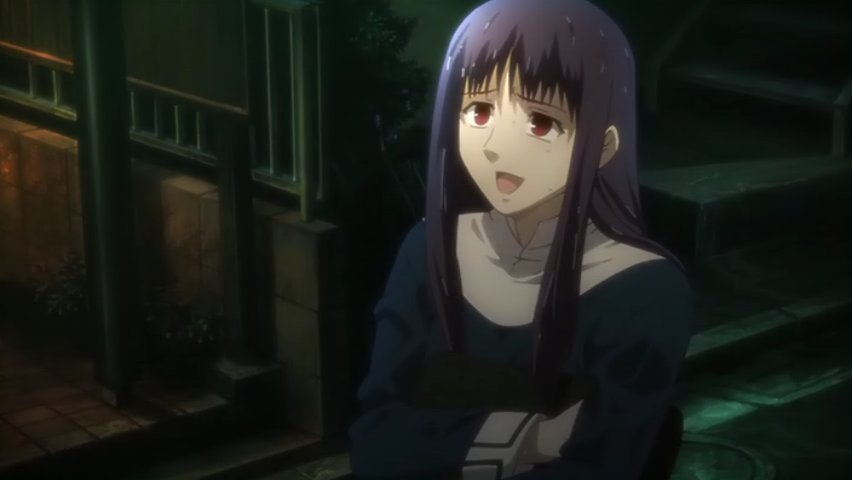
“Does your stomach hurt?”
“No…
Yes, it really, really hurts.
I… think I’m about to cry.
Can I cry?”
As Mikiya nods kindly, through the haze of pain came a flash of wild joy on Fujino’s face. Feeling pain and crying, the simple, natural experience was precious to the girl who had never in her life felt it. The sensation of pain, linked to the sensation of living, is probably the strongest running theme throughout the film. Through Fujino’s perspective, pain – though intensely unpleasant – was also irrevocably desirable, and thus the show subtly casts life and living in a similar paradox: it is suffering, and yet we clutch on to it and would never let go. Life is painful but wonderful.
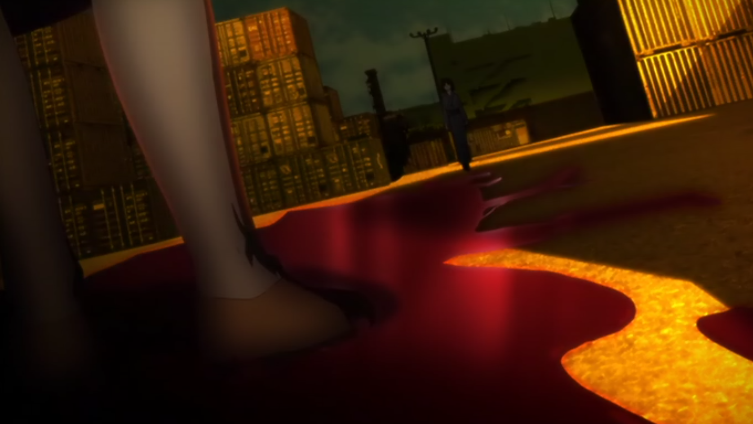
Throughout the film Fujino repeatedly and verbally expresses her wish to become normal, but is normality really what she is after? That Fujino’s supernatural psychokinetic ability is linked to her sense of pain brings an interesting twist to the table: she can never attain normality. As one part of her is restored to normality with the return of her sense of pain, she inevitably also steps further with the simultaneous return of her powers. In all likelihood her motivations aren’t something as generic as normality.
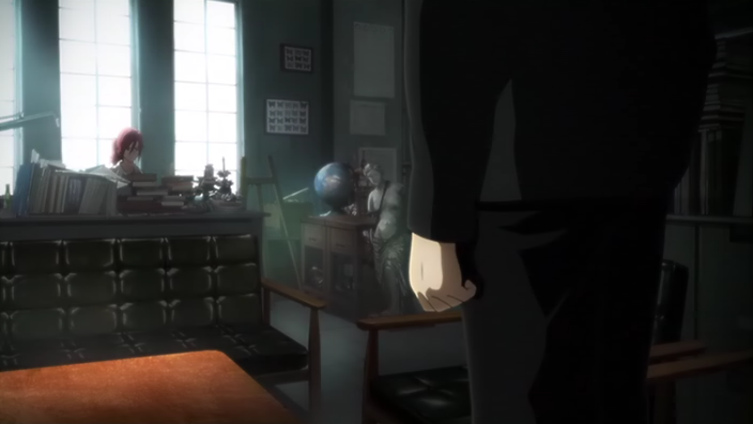
To put it roughly, [not feeling pain] is like not having a body.
It must be hard to feel you’re alive.
A girl like that, should she come to know pain, must desire even more of it
Pain is filling a void in Fujino that had always existed, and is making her feel more alive than ever. In all likelihood that is the sensation she thirsted after – Living. The hidden, complicating part of the story is that her newly returned powers are also part of that sensation. She wants to use her powers, just as Shiki aches to use hers. All this enigmatic Shiki banter on how she can sometimes kill Fujino and sometimes not should surely refer to bouts in which Fujino regains her pain and her powers and bouts in which she relapses into insensitivity and powerlessness, respectively. The possession of a superhuman destructive power appears to compel the possessor to use it, and thus it is only when Fujino regains her powers that she manifests the murderous intent that Shiki can sense. This is the reason given for Shiki’s desire to kill Fujino – that while Shiki in her awareness of the meaning of murder had to bite her tongue against the urges of her powers, Fujino was just letting loose.
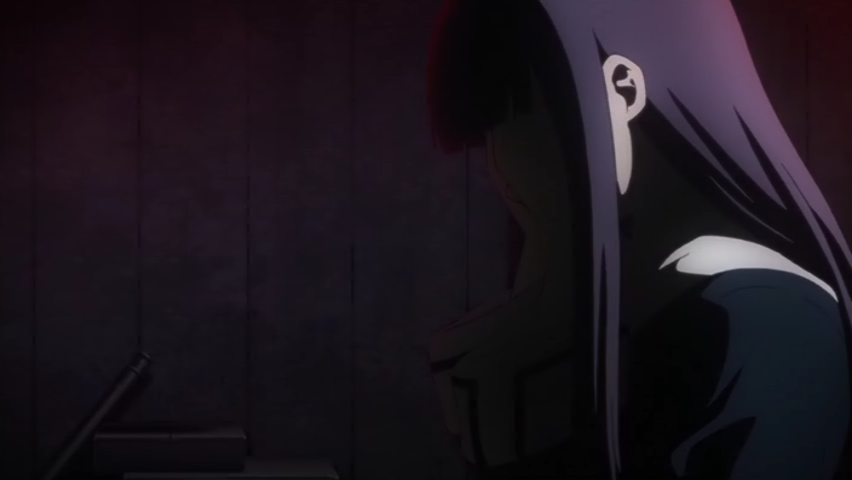
Perhaps tellingly, in each bloody scene of murder, Fujino softly recites the necessity of her terrible deeds, even when her victim was beyond comprehending her words.
Almost as if she needed to believe it herself.
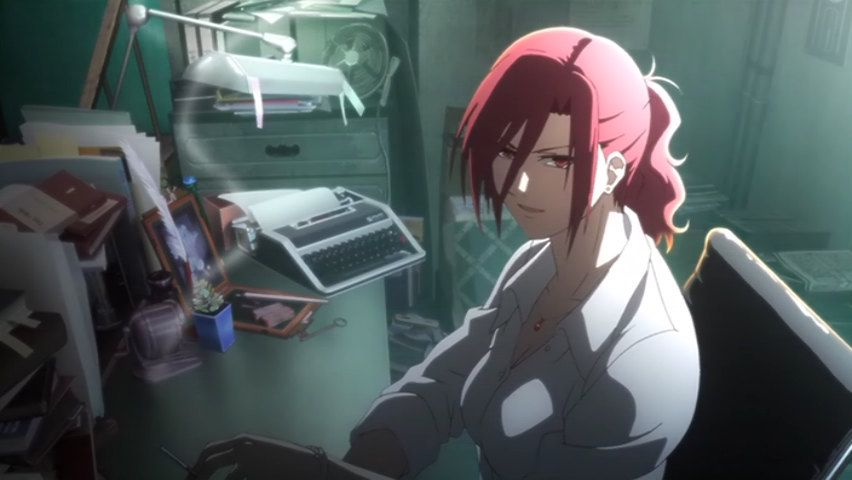
Aren’t we being impatient Shiki.
Are you that hungry?
Here’s a fun thought though: how different are Shiki’s accusations compared to Fujino’s own rationalizing of her killings? Not so different! Both have good reasons for wanting to shed blood that we can sort of sympathize with, but it is clear that both had a guttural ulterior motive. As much as both repeatedly attempted to spin logical webs to say “I am not like you”, they are very much the same.
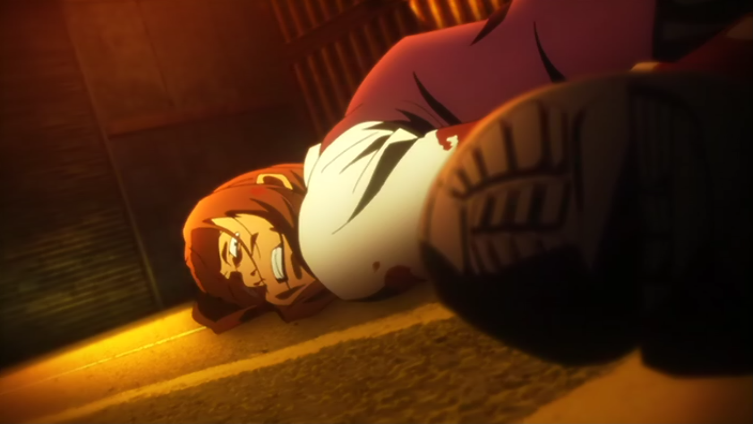
Humans don’t die like that.
A person who didn’t end his life like a human isn’t human anymore
Some more Kara no Kyoukai-esque perspective on life and humanity there. As briefly noted in the first film’s post, Kara no Kyoukai tends to interpret life/humanity as disjunct from the physical vessel. As a person is (literally here!) twisted into insanity, the human has been extinguished, and the horrific, incoherent remnant of the physical shell is but a lingering mockery of what was.

I like how both girls are connected to Mikiya, in a quieter, tasteful respin of the harem motif. There is scarcely many apparent traces of actual romance, but it feels like Mikiya is so much more than a target for their adoration. He is almost an idol, an ideal and a symbol of meaning. It’s really interesting how Kara no Kyoukai portrays the voice of kindness and love, embodied in Mikiya. It doesn’t quite portray it as the all-knowing “truth” nor the all-encompassing “way”, but almost simply a different perspective, an interpretive direction. Watching Mikiya act and behave is like watching a heuristic in action, parsing the complexity of reality into his simple terms – trust when one can trust, protect when one can protect, save when one can save, care when one can care. The simplification is visibly naive and often borderline ludicrous, but in the larger scale and the longer run, it eventually proves its wisdom. In the show it feels like Mikiya is always walking just a little ahead, always caring, always trusting, always sympathizing; while Shiki, like us, flounders along against the storm of distracting emotions, bitterly cursing Mikiya for a fool, but knowing nonetheless to listen to his ramblings and follow his advices.
I don’t know how large of an audience I can speak for, but this is an idea and a feeling that I resonate with. Much of the more profound pleasures of watching Kara no Kyoukai isn’t gleaned from the plot or even the dialogue (even if there are some great stuff in those as well); but in the simple, unspoken “doing” and “behaving” and the subtle directions the story takes in response.
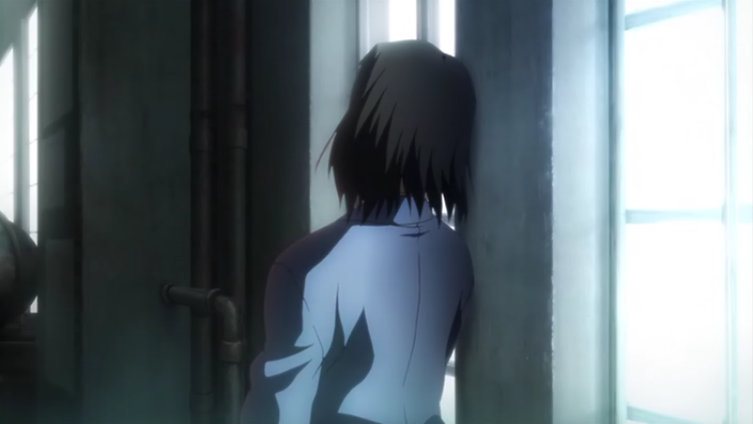
“Shiki, I’m going now, Don’t be too reckless.”
“You’re the reckless one, Christ.
I guess it’s true that stupidity is curable only by death.… I’ll do my best”

Listen, hurt isn’t something you need to bear.
Pain is something you have to speak up about.
In any normal situation this is clearly an invitation to confide, to share pain. The irony is in the fact that what Fujino needed to speak out on isn’t pain, but her lack thereof. If only she had spoken up, especially to someone like Mikiya, perhaps things would have been very different in the present day.
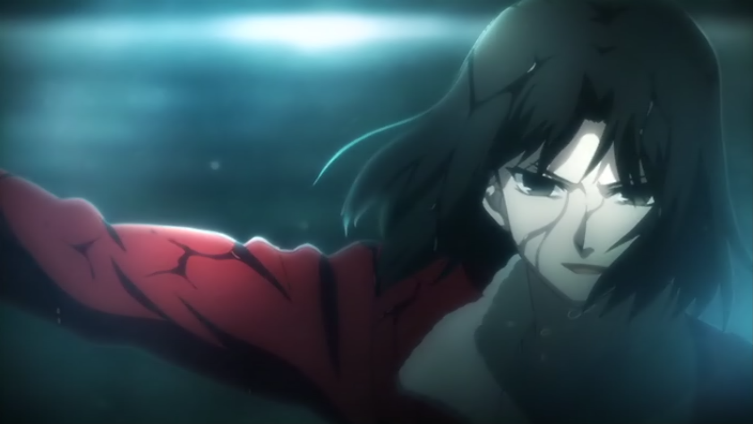
After that incredible rooftop battle BGM in the first film, we get another, entirely different battle piece that boasts equal ability to steal my breath and send chills coursing through my veins. Fantastic. And then there was that weeping, sorrowful piano solo, near the end as the entire bridge came crashing from Fujino’s power. Now that I have been told the name behind the music I’m going to praise by name: Yuki Kajiura is amazing. Amazing doesn’t even begin to capture the work she has done in Kara no Kyoukai.
By the way, also loved Mamiko Noto’s performance as Fujino. We don’t often get to hear her trademark gentle voice work and her panicked, rage-laced screams in the same episode.
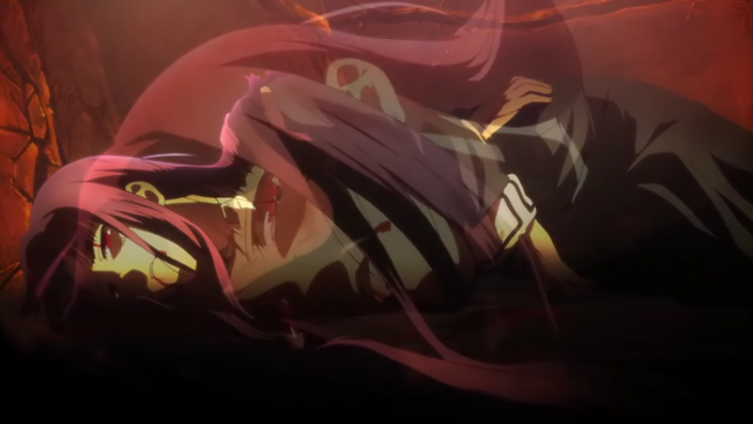
This was the culmination of the film for me. Most of you probably understood the simple pun used here, but let me just go ahead and explain it. Itai is the word for pain, and it is also a suffix that expresses to want. The repeated, whispered, overlapping words of Fujino’s excruciating pain and lonely longing for more of life as she struggled to survive was heartrending, but beautiful in it’s own awed, subdued way. This is the moment that pivots on an entire film’s worth of describing Fujino’s existence. She was brutally and repeatedly raped, she had so much blood on her hands she could never clean it away, she had a fatal disease and an imagined knife wound, with her own father calling her a monster and paying to have her slain. She was at the darkest hour of a troubled life, and yet she fought so desperately and longed so achingly to live on. To speak. To feel. To exist. Life downtrodden and destroyed, and yet life in its purest magnificence.
Don’t.. want to die yet..
It hurts.. It hurts..
It hurts.. It hurts..
I want.. to live.. some more.. (It hurts)
I want.. to talk.. some more.. (It hurts)
I want.. to think.. some more.. (It hurts)
I want.. to be here.. some more.. (It hurts)
Makes you think about where you are, what you are doing, and how are you relishing your life.

Loved Shiki and Mikiya’s little exchange at the end, loved the pretty BGM that accompanied it, though both paled in comparison to Fujino’s final scenes. Also liked it that Fujino survived. For a show as unfazed as Kara no Kyoukai with blood and gruesome murder, I think it meant a little something that Fujino lived: a trace of sanity in the portrayal of the universe, a small offset to the darkness in the rest of the film. And Shiki’s line to end the film:
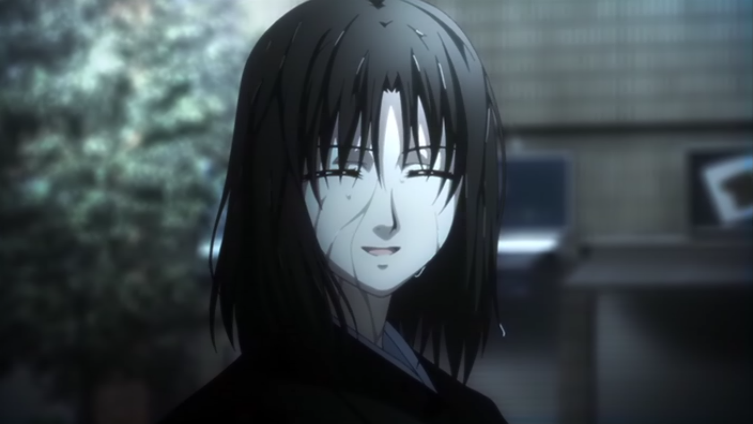
A slight.. just a slight murderous impulse leaning towards you
Isn’t it an intriguing show, when this is probably legitimately the most romantic thing Shiki can and has ever said to Mikiya?
Be sure to sit through the ED. I probably won’t do an anisong post this time round, but it is an amazing song, about living and transcending and overcoming, with tremendous resonance with the events of the film. Listen to it.
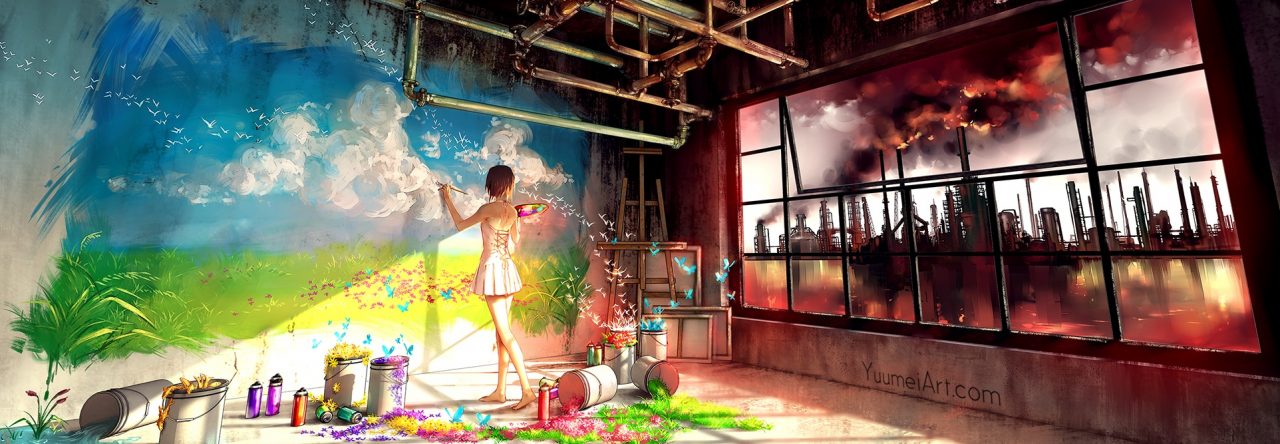
Zimeus
holy….your posting these (somewhat) recently. omg. that is awesome. i feel such…elation…that someone like you exists. i love this series. from every minor detail in the story to the beautiful soundtrach composed by yuki kaijura.
(in fact i watched quite a few series just because of her composing the soundtrack…o but i found this series first)
did you see the other movies? (4,5,6, and 7) ill be looking forward to your posts about them if you ever make them (dont feel pressured to make them though). I find your posts very enlightening and more than worth reading.
–as a side note…its sad that too many people have missed this series and jumped to the ones that came after it (tsukihime and fate/stay night). they missed something so great and have become stuck with the mindset that those are better. (they are WRONG)
–P.S. sorry if my reply seems incoherent at times or is substandard. oh…if only you lived in new jersey. (near me)
Jason "moofang"
Thank you, thank you. I was just starting to feel a little lonely here with my massive KnK fandom xP It totally elates me as well that you feel similarly about this show. Also glad you liked my posts. I’ve already watched all the other movies – more than once, and I do plan strongly to crunch and finish a post for every one, though I tend to be really slow with stuff like this.
And your comment was perfectly legible, so don’t worry :D sadly, I don’t live anywhere even remotely close to New Jersey :(
Prince Brenden
Awsome to read, and you tell the details so understanding. Its not much i can say that you havent, but what i can say is “This is the only masterpiece of an anime for me” i have seen many epic, but this anime have it all going, have seen it more then once and never gets old, its just got better the second time, when i did understand more of it,,,,, Truly happy for your writting :)